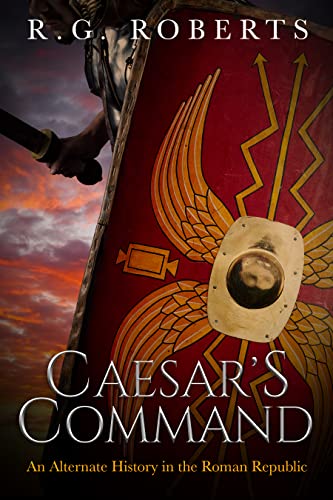Roberts deftly reshapes known history into exciting new territory.
Quintus Sertorius is a man on a mission. Tired of the domination and influence of the Republic, he follows in his Roman father’s rebellious footsteps. Unsatisfied with nothing less than freedom for Iberia, Quintus lays plans for an assault and raises a formidable army. These actions are the thorny crown at the end of Gaius Julius Caesar’s tenure as governor of Hispania Ulterior. Hoping for a smooth transition back to Rome on his carefully plotted path to consulship, Caesar’s own principles prevent him from ignoring the incursion. With no choice but to deal with the rebel armies, Caesar takes to the battlefield. Cultural biases, entangled family affairs, unsavory alliances and political maneuvers fill in the spaces between grand battle scenes as these two powerful men lock horns in a pride-fueled struggle.
If history books were written with as much personality as Caesar’s Command, we would surely face a renaissance of historical appreciation! Despite the book being centered around political upheaval, war and betrayal, Roberts integrates subtle shades of humor. “Praetorian governors like Quintus Arrius were a denarius a dozen.” Readers with only a modest knowledge of European history will be rewarded with a litany of familiar names and events, although Roberts deftly reshapes known history into exciting new territory.
Caesar’s Command is a compelling fictional novel that is “based upon the premise that one single event in history can change everything.” The story takes place during a pivotal time for the Roman Republic, a period where societal etiquette, rigorous formalities and the burden of expectation guide every interaction, down to choosing a companion for the night. Although the politics and attitudes echo in so many ways the questionable ethics and pointless palaver of modern governments, the author gives all parties fair treatment. In this way, audiences can form opinions of the characters and situations based on the skilled writing rather than historical bias or conjecture. Caesar’s character is a great example of this ingenious manipulation. While he is commonly known to have possessed a mind for military conquests, a penchant for extramarital affairs and a charisma that quickly melted into cruelty, Roberts’ Caesar comes to life in a way history books can’t rival. Not only is he focused, intelligent and driven, but he earns the admiration of readers as he objectively wades through the treacherous waters of the Republic. Roman history is skillfully rewritten in R.G. Roberts’ rousing counterfactual novel, Caesar’s Command.







